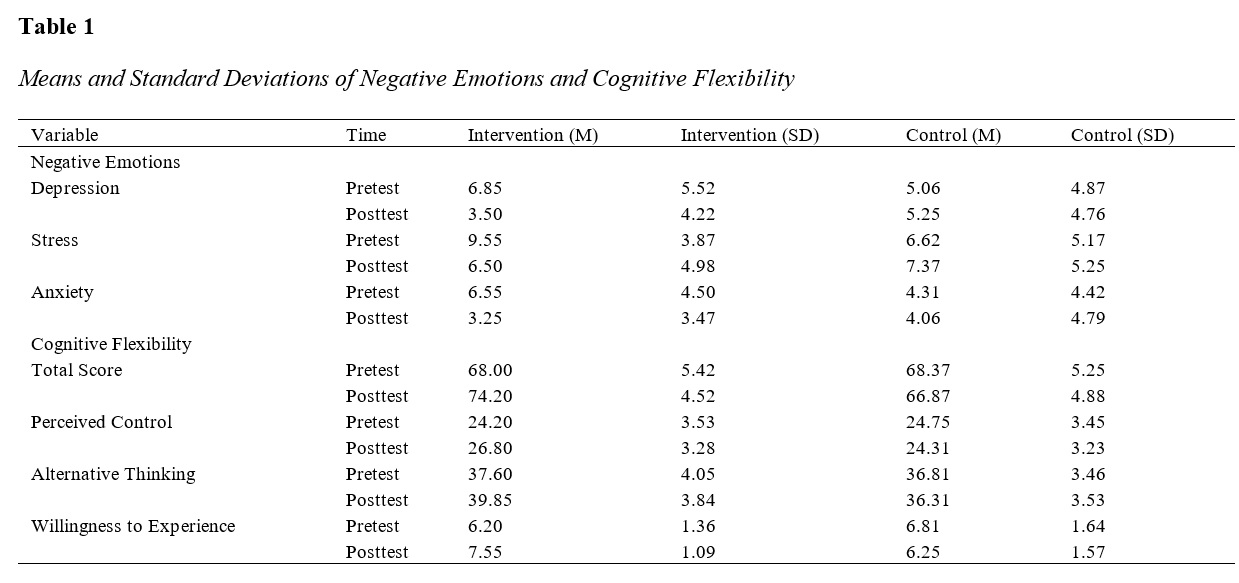The Effectiveness of Lyubomirsky’s Happiness Training on Negative Emotions (Depression, Stress, and Anxiety) and Cognitive Flexibility in Mothers of Children with Autism Spectrum Disorder
Keywords:
Happiness training, depression, anxiety, stress, cognitive flexibility, mothers, autism spectrum disorderAbstract
Objective: The present study aimed to investigate the effectiveness of happiness training based on Lyubomirsky’s model in reducing negative emotions and enhancing cognitive flexibility in this population.
Methods and Materials: This study employed a quasi-experimental design using a pretest-posttest control group format. The statistical population included mothers of children with autism who attended the "Golhaye Beheshti" Center in Qom during spring 2024. A total of 30 participants were selected through simple random sampling and assigned to either the experimental or control group. The experimental group participated in eight 90-minute sessions of happiness training. The research instruments included the Depression, Anxiety, and Stress Scale (DASS-21) and the Cognitive Flexibility Scale developed by Dennis and Vander Wal (2009). Data were analyzed using analysis of covariance (ANCOVA).
Findings: The results indicated that Lyubomirsky’s happiness training significantly reduced depression, anxiety, and stress levels while significantly increasing cognitive flexibility in the experimental group (P < 0.05).
Conclusion: Happiness-based intervention can serve as an effective strategy for promoting the mental health of mothers of children with autism by alleviating negative emotions and strengthening their cognitive capacities.
Keywords: Happiness training, depression, anxiety, stress, cognitive flexibility, mothers, autism spectrum disorder.
Downloads
References
Afzali, M. H., Delavar, A., Borjali, A., & Mirzamani, S. M. (2007). Psychometric properties of the Depression Anxiety Stress Scales-21 (DASS-21) in a non-clinical Iranian sample. Iran J Psychol, 3(12), 287-298.
Al-Graiti, R. H. A., & Seki Öz, H. (2024). A descriptive study on the depression, anxiety, and stress levels of mothers with autistic children. J Nurs Care Res, 1(1), 7-12. https://doi.org/10.51271/JNCR-0002
Alghamdi, K., Alahmadi, S., Sayedahmad, A., & et al. (2022). Psychological well-being of mothers of children with autism in Saudi Arabia. Cureus, 14(3), e23284. https://doi.org/10.7759/cureus.23284
Asaoka, H., Okamura, S., Baba, C., Fujimoto, N., Ishizuka, Y., & Takahashi, T. (2023). Influence of the COVID-19 pandemic on children with autism spectrum disorder and their mothers in Japan. Autism Dev Lang Impair, 8. https://doi.org/10.1177/23969415231212347
Aydemir, M., & Önal, G. (2024). Comparison of cognitive flexibility and resilience levels in mothers of children with specific learning disability, autism spectrum disorder, and normal development. OPUS J Soc Res, 21(4), 208-220. https://doi.org/10.26466/opusjsr.1485452
Azad, R., & Aleyasin, S. A. (2023). Meaning of life, mothers of mentally retarded children, positive psychotherapy, psychological well-being, resilience. Rooyesh, 12(5), 161-172. https://frooyesh.ir/article-1-4573-fa.html
Bee Wah, Y., Mohd Nasir, N. N., Hadrawi, M. F., Kamaruddin, A. A., Jannoo, Z., & Afthanorhan, A. (2024). Effects of stress and self-efficacy on quality of life of mothers with autistic children: Covariance-based structural equation modeling approach. Belitung Nurs J, 10(2), 201-208. https://doi.org/10.33546/bnj.3096
Çomaklı Duvar, N., Kabakuş, A. K., İyit, N., & Alkan, Ö. (2025). A study on the determination of the factors affecting the happiness levels of older individuals during the COVID-19 pandemic in Turkish society. PLoS One, 20(1), e0316000. https://doi.org/10.1371/journal.pone.0316000
Dennis, J. P., & Vander Wal, J. S. (2010). The Cognitive Flexibility Inventory: Instrument development and estimates of reliability and validity. Cogn Ther Res, 34(3), 241-253. https://doi.org/10.1007/s10608-009-9276-4
Elemo, A. S., & Can, E. (2024). Depression and psychological help-seeking attitude among Turkish mothers of children with autism: problem-focused coping as a mediator. Psychol Health Med, 30(3), 540-554. https://doi.org/10.1080/13548506.2024.2440655
Elemo, A. S., & Can, E. (2025). Depression among mothers of children with autism. Psychol Health Med, 30(3), 540-554. https://doi.org/10.1080/13548506.2024.2440655
Faraji Amiri, K., Rafieipour, A., & Sabet, M. (2022). The effectiveness of positive psychology interventions on increasing vitality and life satisfaction among students of the University of Art. J Iran Med Council, 40(3), 190-198. https://jmciri.ir/browse.php?a_code=A-10-1-2712&sid=1&slc_lang=fa
Garcia, A. S., & et al. (2022). Hope and self-compassion in parenting stress. Fam J, 30(2), 164-173. https://doi.org/10.1177/10664807211040836
Hohl, K., & Dolcos, S. (2024). Measuring cognitive flexibility: A brief review of neuropsychological, self-report, and neuroscientific approaches. Front Hum Neurosci, 18, 1331960. https://doi.org/10.3389/fnhum.2024.1331960
Kermani, Z., Khodapanahi, M. K., & Heidari, M. (2020). Psychometric properties of the cognitive flexibility inventory among Iranian parents. J Appl PsycholVL - 5(3), 7-23.
Kiye, S., & Çiçek Habeş, E. (2024). The mediating role of cognitive emotion regulation in the relationship between cognitive flexibility and psychological well-being. INUJFE, 25(3), 1292-1310. https://doi.org/10.17679/inuefd.1481952
Kulasinghe, K., Whittingham, K., & Mitchell, A. E. (2021). Mental health, broad autism phenotype and psychological inflexibility in mothers of young children with autism spectrum disorder in Australia: A cross-sectional surveyJO - Autism. 25(5), 1187-1202. https://doi.org/10.1177/1362361320984625
Lovibond, S. H., & Lovibond, P. F. (1995). Manual for the Depression Anxiety Stress Scales. Psychology Foundation of Australia. https://doi.org/10.1037/t01004-000
Lyubomirsky, S. (2008). The how of happiness: A new approach to getting the life you want. The Penguin Press. https://www.amazon.com/How-Happiness-Approach-Getting-Life/dp/0143114956
Martinez, R. L. (2024). Sonja Lyubomirsky: Pioneer in the empirical study of happiness. Appl Res Qual Life, 19, 3545-3547. https://doi.org/10.1007/s11482-024-10386-x
Moghtadayi, M., & Khosh Akhlagh, H. (2015). Effectiveness of acceptance and commitment-based therapy on psychological flexibility of veterans' spouses. Iran J War Public Health, 7(4), 183-188. https://www.sid.ir/paper/152228/fa
Rahnama, F., Beyazi, M., Rajaei, A., & Khoeinejad, G. (2020). Comparison of the effect of neuropsychological therapy, rhythmic movements and cognitive empowerment on the executive functions of students with specific learning disorder. ijpn, 8(1), 82-93. http://ijpn.ir/browse.php?a_id=1515&sid=1&slc_lang=fa&ftxt=0
Rastelli, C., Greco, A., Kenett, Y. N., & et al. (2022). Simulated visual hallucinations in virtual reality enhance cognitive flexibility. Sci Rep, 12, 4027. https://doi.org/10.1038/s41598-022-08047-w
Soltani, S., Khodapanahi, M. K., & Heidari, M. (2020). Validation of the Persian version of the Cognitive Flexibility Inventory in parents of children with special needs. J Psychol Stud, 16(2), 45-62.
Zu, Y. F., Xu, G., Du, Y. S., Xi, J., Chen, Y. T., & Li, Y. H. (2019). Psychoeducational intervention improves Chinese mothers' parenting and symptoms of their autistic children. Soc Behav Pers, 47(7), 1-20. https://doi.org/10.2224/sbp.8013

Downloads
Additional Files
Published
Submitted
Revised
Accepted
Issue
Section
License
Copyright (c) 2025 Fatemeh Mahjoor (Author); Alireza Fazeli Mehrabadi (Corresponding Author)

This work is licensed under a Creative Commons Attribution-NonCommercial 4.0 International License.




















